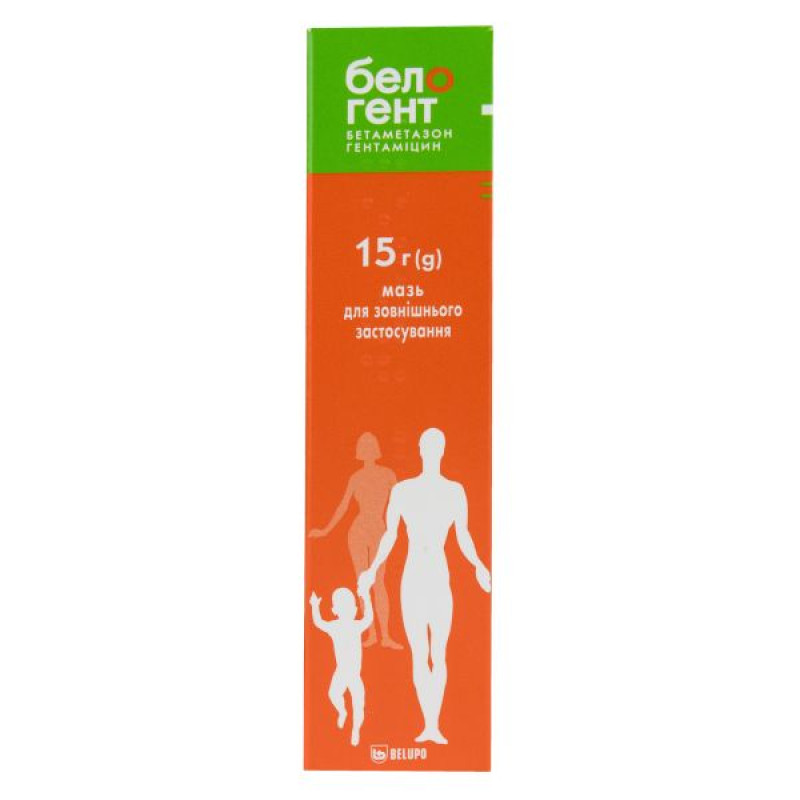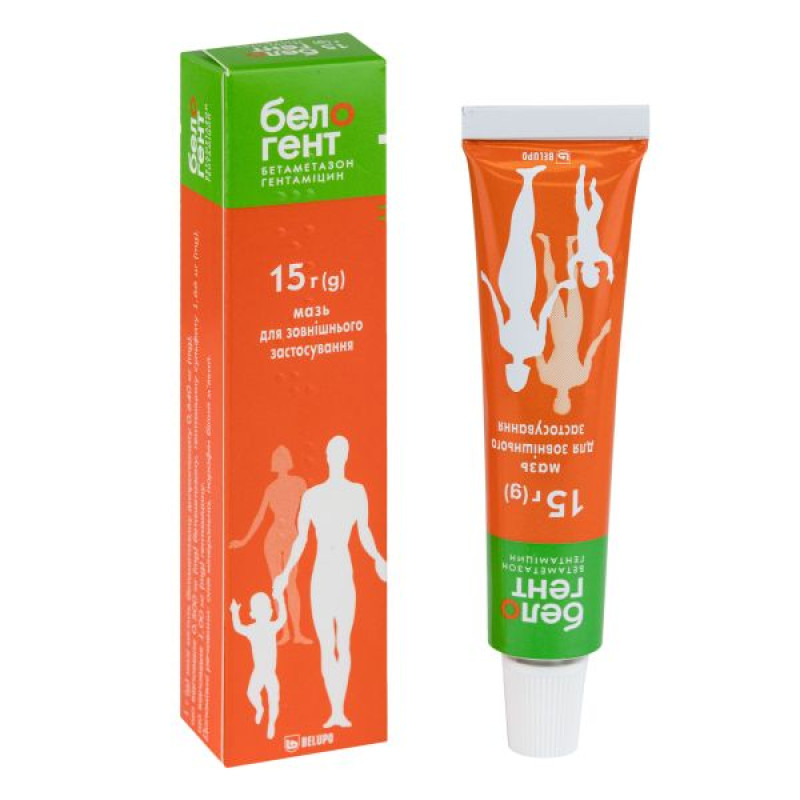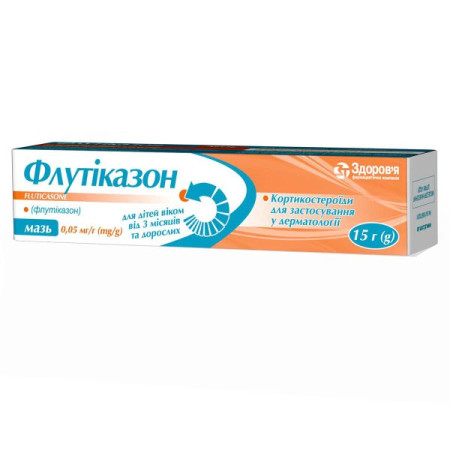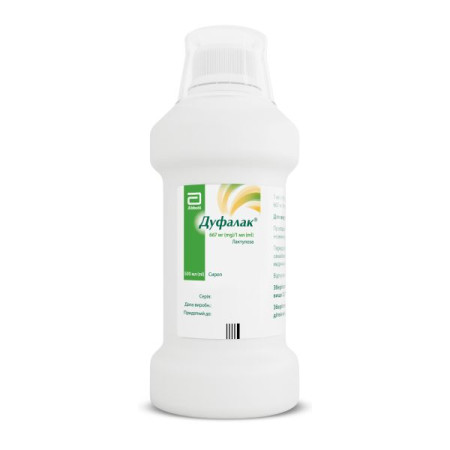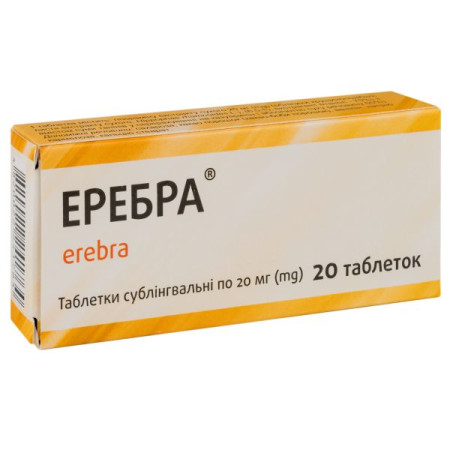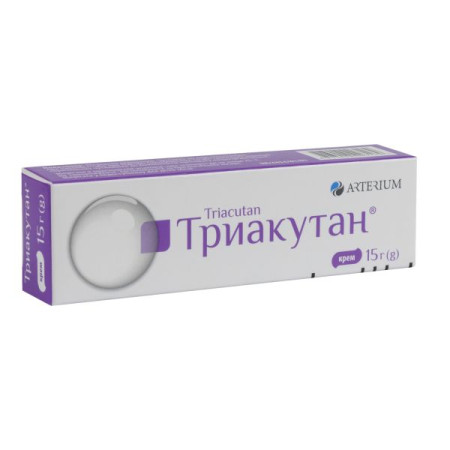Belogent ointment for external use tube 15 g
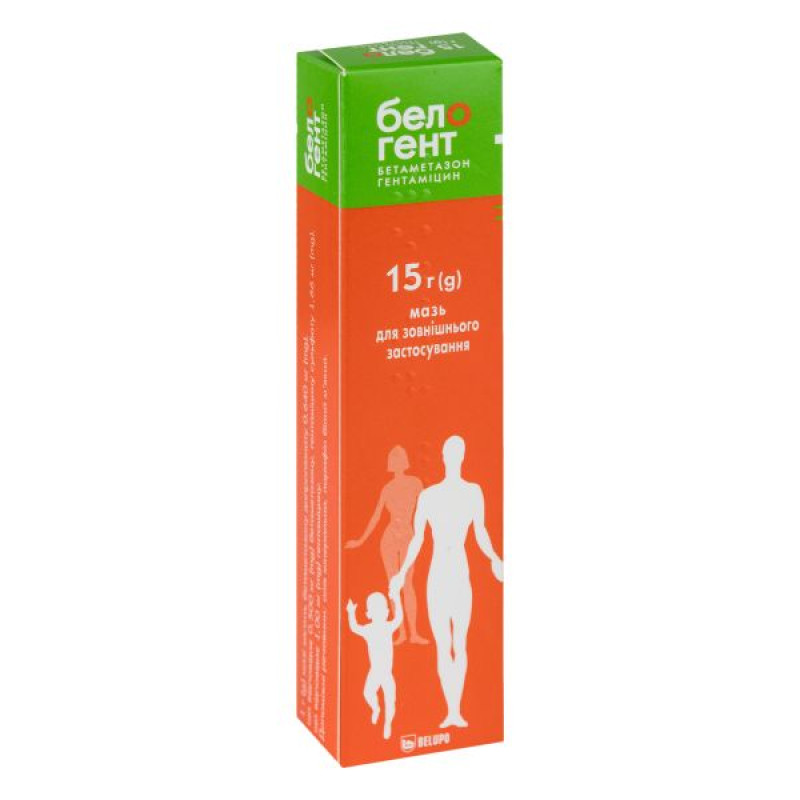
Pharmacological properties
Pharmacodynamics. A drug for topical use. The components of Belogent cream have a combined effect in the treatment of inflammatory skin changes of allergic etiology, additionally complicated by bacterial infection, the course of which is accompanied by hyperkeratosis.
Betamethasone dipropionate is a synthetic fluorinated derivative of hydrocortisone. It easily penetrates the skin, providing a strong local anti-inflammatory, antipruritic and antiallergic effect. Eliminates the causes of inflammatory processes, prevents the release of histamine and the appearance of local allergy symptoms. Due to its local vasoconstrictor effect, it reduces exudative reactions.
Gentamicin sulfate belongs to broad-spectrum antibiotics. It has antibacterial activity against gram-negative and some gram-positive bacteria. Indications for its use in the form of an ointment are secondary infections in skin diseases, if the infection is caused by bacteria sensitive to gentamicin, as well as when such an infection is suspected.
Pharmacokinetics. Betamethasone dipropionate is NOT biotransformed in the skin (absorption does not exceed 1%). After penetration into the body through the skin, it is metabolized in the liver and excreted mainly in the urine, to a lesser extent in the bile. Absorption of betamethasone dipropionate through the skin increases when applied to delicate skin, in the folds, when applied to skin with damaged epidermis or skin damaged by the inflammatory process. In addition, absorption increases with frequent use of the drug or after application to a large surface of the skin. Absorption of betamethasone dipropionate through the skin in young people is more pronounced than in adults.
Gentamicin sulfate is not absorbed after topical application to intact skin, but may be systemically absorbed after application to skin damaged by trauma, burns, and ulcers.
Gentamicin sulfate is not biotransformed in the body and is excreted unchanged in the urine.
Indication
Moist inflammatory skin conditions complicated by secondary bacterial infection, accompanied by hyperkeratosis, itching or severe allergic reactions, atypical dermatitis, seborrheic dermatitis, chronic lichen simplex, psoriasis, allergic contact dermatitis.
Application
Belogent cream is used only externally.
The cream is applied in a thin layer, lightly rubbing, to the affected skin surface 2-3 times a day, depending on the severity of the condition. The cream should not be used under an occlusive dressing. If it is absolutely necessary to use a dressing, it is necessary to apply a bandage that allows air to pass through, and do not use a sealing, oilcloth bandage. Treatment should not be carried out for 2 weeks. Do not use 45 g of cream within 1 week!
Contraindication
Hypersensitivity to corticosteroids, gentamicin or components of the drug. viral, fungal or tuberculous skin diseases, skin reactions after vaccination, skin neoplasms, rosacea, chickenpox, HIV infection, shingles, open-angle glaucoma, phlebitis and trophic ulcers. pregnancy and breastfeeding. do not apply to large areas of affected skin, especially in cases of impaired skin integrity, such as burns. do not apply to facial skin. children under 2 years of age.
Side effects
When using the drug, especially under an occlusive dressing, the following may occur: burning sensation, itching, irritation, dryness, folliculitis, acne, local hypo- or hyperpigmentation, perioral dermatitis, skin maceration, secondary infection, skin atrophy, striae, and perspiration.
When used for longer than the recommended period, acne, steroid purpura, epidermal growth inhibition, subcutaneous tissue atrophy, dilation of small blood vessels, and folliculitis may occur.
When used on the skin of the face, oral dermatitis is possible.
After application to the skin of the eyelids, it can sometimes cause increased manifestations of glaucoma or accelerated development of cataracts.
With prolonged use, the drug can cause a significant general effect, characterized by the appearance of edema, hypertension, and decreased resistance to infection.
Special instructions
Belogent cream is used to treat wet, acute dermatosis.
If hypersensitivity reactions (skin irritation accompanied by itching, burning and redness) occur when using the drug, therapy should be discontinued immediately.
It is not recommended to use Belogent cream under occlusive dressings, except when necessary. It is not recommended to use the drug on the skin of the face due to the possible occurrence of dermatitis, similar to rosacea, perioral dermatitis and acne.
Do not use on large areas of affected skin, especially in cases of broken skin, such as burns. Do not use in children under 2 years of age.
Belogent cream should not be used to treat the eyes and around the eyes due to the possible development of cataracts, glaucoma, fungal eye diseases, as well as exacerbation of herpes.
The drug is not used to treat varicose veins below the knees (leg ulcers).
Certain areas of the body, such as the groin, armpits, and perianal areas where there is natural occlusion, are susceptible to the appearance of stretch marks when treated with the drug, so the use of the drug in these areas should be limited as much as possible.
With prolonged use of the cream on a large surface of the body, its absorption increases and the frequency of adverse reactions increases, such as edema, hypertension, increased blood glucose levels, and decreased body resistance.
When there is an increase in the effect of infection at the site of application, additional antimicrobial or antifungal treatment may be prescribed.
It should be remembered that prolonged topical therapy with gentamicin may cause the development of microorganisms resistant to aminoglycosides. Therefore, topical therapy is not recommended in immunocompromised patients or other patients at high risk. If persistent superinfection occurs during treatment, gentamicin treatment should be discontinued and appropriate therapy should be instituted.
The patient should inform the doctor about all adverse reactions that occur when using the drug.
Ability to influence the reaction speed when driving vehicles or working with complex mechanisms. There is no data on the effect of Belogent cream on the ability to drive vehicles or work with complex mechanisms.
Use during pregnancy and breastfeeding. It is not recommended to use the drug during pregnancy and breastfeeding.
If it is necessary to use Belogent cream, breastfeeding should be discontinued. Avoid contact of the child with the area of the mother's skin on which the cream is applied.
Children: Do not use in the treatment of children under 2 years of age.
Use in children is possible only on prescription and under the supervision of a doctor.
Since the ratio of body surface area to body weight in children is higher than in adults, increased absorption is possible with topical application, which can lead to systemic toxic manifestations. Therefore, the drug should be used in children with great caution and for a minimum period of time.
Interactions
During treatment with GCS, prophylactic vaccinations should not be performed.
Overdose
After prolonged use on a large surface of the skin, a decrease in the body's resistance to infections, the appearance of ag, edema is possible.
In the case of application of the drug to large affected areas of the skin for a long period (3 weeks) and when using an occlusive dressing, as well as with prolonged use in children with renal failure, increased absorption and manifestation of systemic action may occur, while the development of suppression of the hypothalamic-pituitary-adrenal system with growth retardation, hyperglycemia, glucosuria and Cushing's syndrome is possible.
Excessive or prolonged treatment with gentamicin may lead to exacerbation of fungal diseases or the development of superinfection.
Overdose therapy. In case of overdose, the drug must be discontinued. Therapy is symptomatic with the use of conventional measures to maintain normal body function. If necessary, electrolyte balance is corrected. In case of chronic toxic effects, gradual discontinuation of the drug is recommended.
Storage conditions
Store at a temperature not exceeding 25 °C.
There are no reviews for this product.
There are no reviews for this product, be the first to leave your review.
No questions about this product, be the first and ask your question.







